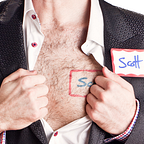What’s the deal with double dippers?
Seinfeld once did a notable episode about double dipping.
Constanza attends a funeral reception and walks over to the snack table. Meanwhile, a relative of the deceased carefully watches him from across the room. George takes a chip from the bowl, dips it, takes a bite, and then dips again.
Then the spying man hurriedly comes over to the table.
What are you doing? Did you just double dip that chip?
George is baffled by the accusation, but the man insists:
You dipped the chip. You took a bite. And you dipped again. That’s like putting your whole mouth right in the dip! From now on, when you take a chip, just take one dip and end it!
This was always a favorite episode of mine.
First of all, it’s a hilarious social commentary. I remember my friends calling each other out for double dipping at parties all the time. I guess it was the thing to do back then. We didn’t have social media platforms to shame each other yet.
Anyway, this salty moment is more than classic nineties sitcom minutia. It’s a perfect metaphor for an unproductive behavior millions of people perform all the time.
Except instead of inside of a bowl of chips, it’s inside of their own heads.
People double dip, and sometimes even triple or quadruple dip, when it comes to making decisions.
Here’s an illustration of that. Imagine you and a friend are getting together for coffee. When you text them the night before to confirm the destination, they say they don’t really have an opinion on where to meet tomorrow.
You text your friend this:
Now, imagine your friend texts back and says this:
Sound the alarm, that’s a case of double dipping.
It’s when a moment that should be the end of the conversation suddenly becomes the starting point of it.
Your friend has effectively taken their half eaten chip and put it right back in the bowl for another pass.
What they should have texted back was this:
But they just couldn’t resist the double dip.
They had to put their whole mouth right into the bowl.
And as result, they increased the energy output and interpersonal anxiety of a simple exchange of retail information.
Seinfeld’s actual voice is ringing inside my head as I write this:
What’s the deal with double dippers? Who are these people?
Naturally, this issue has nothing to do with dipping and everything to do with deciding. It’s the paradox of choice in action.
Barry Schwartz wrote in his bestselling book that exhaustive search of possibilities entails a high information cost that isn’t worth incurring. Instead, we should determine how much information is necessary to make a good decision while simultaneously noticing when information seeking has reached the point of diminishing returns.
Personally, decisional double dipping infuriates me. Excessively thoroughness gives me hives. I actually feel worse off as my options increase.
Don’t tell me we can meet anywhere I want for coffee. There are literally four thousand options to pick from in this city. Just give me an address so we can end the deciding process and start connecting.
Because that’s where our best energies should be devoted. Not finding the place with the best reviews, but finding any place, literally any establishment that has chairs, so we can sit down and remember why we love being in each other’s company in the first place.
Coffee is merely the vehicle, connection is what we really crave.
And if you think caffeine is the stronger addiction, try going without talking to another soul for the next two weeks and see how much energy you have every morning.
In the end, double dipping is not only a crime of snacking, it’s a crime of cognition. Anytime we embark on one of our neurotic quests or endless tangles of option anxiety, it means that we are no longer present, and joy has left the building.
My theory is, the best decision is the one you don’t have to make.
There is no corner around which there might be something better. You simply look no further and allow the countless other available choices to become irrelevant, so you focus on savoring the moment.
Since the moment is all we have anyway.
From now on, when you take a chip, just take one dip and end it.
How many times are you dipping your cognitive chip in the bowl?
